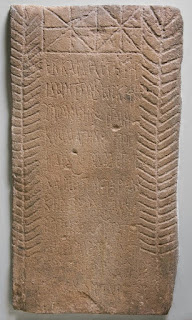Let some traveller, on seeing Hermes of Commagene, aged sixteen years, sheltered in the tomb by fate, call out: I give you my greetings, lad, though mortal the path of life you slowly tread, for swiftly have you winged your way to the land of the Cimmerian folk. Nor will your words be false, for the lad is good, and you will do him a good service.The Hermes in this third-century Greek inscription isn't the winged messenger of the Greek gods but a teenager who died and was memorialized on what is now known as the Brough Stone, preserved in the Fitzwilliam Museum, Cambridge. (Original Greek text and details here.) He had done some travelling of his own before he met his end in Roman Britain; Commagene, where he was born, was a small kingdom in what is now eastern Turkey. The Cimmerians, to whose land he flies after death, were a barbarian people known, if hazily, to the Classical world, but in the Odyssey Homer locates their country in the dark regions of the far north, just this side of Hades.
Curiously, Robert Fitzgerald doesn't use the word "Cimmerian" (the Greek is Κιμμερίων) in his translation of Book XI, line 14, but refers instead to "the realm and region of the Men of Winter." It's in Pound's Cantos, though:
Came we then to the bounds of deepest water,
To the Kimmerian lands, and peopled cities
Covered with close-webbed mist, unpierced ever
With glitter of sun-rays




3 comments:
“Close-webbed” is really striking.
Pound gave Fitzgerald advice about translating the Odyssey: “Too much iambic will kill any subject matter.” But I don’t know what Pound made of Fitzgerald’s translation.
In the "Note" at the end of Fitzgerald's translation where he gives his acknowledgments he reports receiving "one salutary blast" from Pound. It may have been the same remark. (I note that he didn't say "salutory.")
According to Rhys Carpenter, who wrote a book called Folk Tale, Fiction and Saga in the Homeric Epics, some of the ancient commentators on Homer questioned the reading of the word "Cimmerian," with at least one authority proposing "cheimerian," which apparently means "wintry." Carpenter's book predates Fitzgerald's translation, and I assume he would have been aware of it.
And in fact he mentions Carpenter's book in his Postcript.
Post a Comment